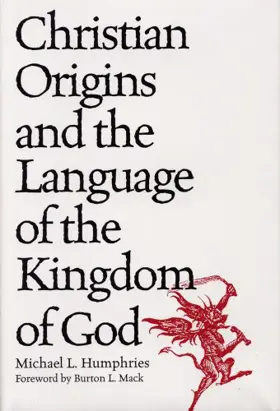

Christian Origins and the Language of the Kingdom of God
Pages
112
Publisher
Southern Illinois University Press
Published
1999
ISBN-13
9780809322305
Traditionally, scholars have traced the origin of Christianity to a single source - the kingdom of God as represented in the message of the historical Jesus. Through a rhetorical critical analysis of one of the most important texts in early Christian literature (the Beelzebul controversy), Michael L. Humphries addresses the issue of Christian origins, demonstrating how the language of the kingdom of God is best understood according to its locative or taxonomic effect where the demarcation of social and cultural boundaries contributes to the emergence of this new social foundation. Humphries establishes the Q and Markan versions of the Beelzebul controversy as relatively sophisticated compositions that are formally identified as elaborate chreiai (a literary form used in the teaching of rhetoric at the secondary and post-secondary level of Greco-Roman education) and that offer an excellent example of the rhetorical manipulation of language in the development of social and cultural identity.
Reviews
Carbondale: Southern Illinois University Press, 1999. Pp. ix + 98, Cloth, $25.00, ISBN 0809322307. Foreward by Burton L. Mack Craig Evans Trinity Western University Langley, BC, Canada, V2Y 1Y1 Michael L. Humphries offers readers an insightful study of the synoptic tradition in which Jesus is accused of being in league with Beelzebul. He believes this tradition is particularly significant because it appears in two early, literarily independent sources: Q (Luke 11:15, 17-18a, 19-26; cf. Matt 9:34; 12:24, 43-45) and Mark (3:19b-30). Form-critically, Humphries identifies the Q and Markan traditions as examples of the elaborated chreia (lit. “useful”), a literary form “wherein each saying acquires its significance as an argument in support of a proposition” (p. 23). The Q and Markan chreiai, Humphries believes, reflect “communities (that) are seeking to account for themselves in the midst of a pluralistic and hostile environment precisely by means of this rhetorical play with language and the subsequent equation of their way of life with the kingdom of God” (pp. 23-24). For the Q community the chreia defends the community’s legitimacy, as “insiders, sons of Israel” (p. 39). The logic of the community’s opponents, probably Pharisees and scribes, is refuted: the exorcisms are evidence of the community’s commitment to the destruction of the kingdom of Satan and of the advancement of the kingdom of God. For the Markan community the chreia serves a christological purposes, arguing that Jesus’ source of power is not Satan, but the Holy Spirit. In contrast to the chreia in Q, the chreia in Mark emphasizes the “personal encounter between Jesus and Satan; not kingdom against kingdom” (p. 56).
[Full Review]
Carbondale: Southern Illinois University Press, 1999. Pp. ix + 98, Cloth, $25.00, ISBN 0809322307. Foreward by Burton L. Mack Scott S. Elliott Boston University Boston, MA 02215 In Christian Origins and the Language of the Kingdom of God, Michael Humphries presents the reader with an outstanding example of myth as a social formative act. Mythmaking—to borrow a term from Burton Mack, from whom Humphries draws heavily—is an ongoing process of negotiation. Various sects and splinter factions jockey for position as it were and contend for authority and dominance, inclusion or exclusion through the use of language. Groups do not appear suddenly ex nihilo; rather, groups gradually emerge in diverse but related forms as they come to define themselves in relation to other groups in their particular locality. Christianity is no different and therefore should be studied not as something founded on the teachings of a single individual but as a process of social bargaining based on the manipulation of language in the service of group goals. Humphries begins his text by illustrating the underlying post-Enlightenment assumption that drives so much of traditional NT scholarship, namely, that the essence or fundamental character of a thing is revealed in a thorough and adequate understanding of its origin. Contrary to this approach, which stresses linearity, homogeneity, and continuity, Humphries illustrates a history (histories) that attests to plurality, disparity, and discontinuity. “The early Christian texts testified not to an incipient and singular movement branching out into diverse and heretical representations of an original but to a discontinuity and difference that only later collapses into an emerging orthodoxy effected through assimilation and exclusion” (p. 5).
[Full Review]
